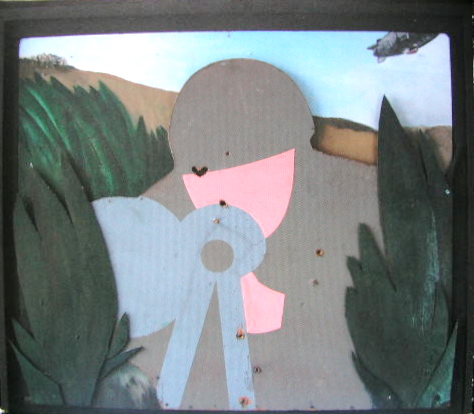
With Responsible, Van Hove commemorates the late drummer Jan Van den Ven, who formed a trio with him and Kris Wanders it ends with a kwela theme. The other two compositions do not quite reach the intensity of this piece. ”Despite the different structural specifications of the individual pieces, the panel is essentially“ monochrome ”, ie not very diverse.Īccording to Jost's description, the piece Machine Gun initially has an “ introduction staccato in tone repetitions ” that is reminiscent of “drum fire” because it is based on a “quasi percussive” style of playing.
#Peter brötzmann octet – machine gun free
In the assessment of Ekkehard Jost, the music of Machine Gun " lives from its emotional heat and its downright breathtaking intensity." Nevertheless, it overcomes the free and unplanned way of playing freeform jazz : "It is an extremely intense, often noisy music, a play process primarily aimed at collective energy production, which is given a certain formal structure through the rudimentary compositional specifications of Brötzmann, Van Hove and Breuker and which - unlike Adolphe Sax - in the planned sequence of collectives, solos and thematic inserts something like a dramaturgy of the process.

The title of the album alluded to a nickname for Brötzmann that Don Cherry had given him in Paris in 1966. Back then, his house in Wuppertal was the contact point for GI’s deserting before the Vietnam War. The trained graphic artist Brötzmann also created the cover of the album with a GI behind a machine gun. ”In a panel discussion at WDR in May 1967, he responded to a question from Siegfried Loch as the essential difference between free jazz and traditional jazz (for example one Klaus Doldinger ) the “responsibility for oneself and society”. On the other hand, you have to know what time you are living in, you have to know that many things have to be changed. The music comes from within ourselves as it is and we do not intend in any way to shock anyone. With his uncompromising music, Brötzmann saw himself as part of the 1968 movement : “A brutal society that allows Biafra and Vietnam naturally provokes brutal music.” In an interview with Siegfried Schmidt-Joos in the Jazz Podium in April 1968, however, he said when asked whether he wants to shock with his music: “Not that. The sound engineers from Radio Bremen had to cover the microphones with borrowed blankets from the Bremen theater fund in order to dampen the volume level and make a recording possible. With this octet he appeared several times during the year at festivals, including at the Essener Songtagen at the end of September 1968, and on Maat the German Jazz Festival in Frankfurt am Main with Gerd Dudek The following week the octet played with Manfred Schoof at Jazz Ost-West in Nuremberg and, reinforced by Schoof and Paul Rutherford in November 1968, at the Total Music Meeting, which was organized as a counter-event to the Berlin Jazz Festival, among others by Brötzmann (the one from the Berlin Jazz Festival at the time was unloaded because he did not want to appear in a suit) was initiated.ĭuring a guest performance by the Brötzmann Octet in May 1968 at the Lila Eule in Bremen, where Brötzmann had previously played frequently, recordings were also made for Radio Bremen, which Manfred Miller was in charge of as the jazz editor in charge and which was then published by Brötzmann on the Machine Gun record. Īs Brötzmann found in retrospect, 1968 was “the year of the great orchestras, where we met among friends to play like crazy.” He was supported by the concert organizer Fritz Rau. Like the previous album, it appeared as an in-house production, "because a record company that was interested in this music was not in sight at the time." In 1968, Peter Brötzmann, who had previously performed in a trio and in 1967 in a quartet, gathered "the top of the European free- Jazz avant-garde around, “besides the named ones, these were Evan Parker, Willem Breuker, Buschi Niebergall and Han Bennink. Machine Gun was Brötzmann's second album after For Adolphe Sax from 1967, which was recorded “under the simplest technical conditions” with Peter Kowald, Sven-Åke Johansson and Fred Van Hove.

Today, the album is considered a milestone in European free jazz, the intensity of which is collective outbursts that “assaults the listener like a gunfire.” ( Jazz Podium ). It was initially self-published and was re-released in 1972 by Free Music Production. Machine Gun is a jazz album by the Peter Brötzmann Octet, which was recorded in May 1968 in the Lila Eule in Bremen. Template: Info box music album / maintenance / parameter error Tenor saxophone, bass clarinet : Willem Breuker.Tenor saxophone, baritone saxophone : Peter Brötzmann.


 0 kommentar(er)
0 kommentar(er)
